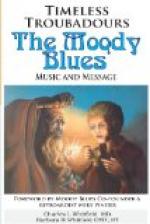a continual struggle to revivify the well-worn tale
by means of strange turns of expression, by the use
of unusual adjectives and forced metaphor, by the
discovery of difficult rimes (
rimes cars) and
stanza schemes of extraordinary complexity. Marcabrun
asserts, possibly in jest, that he could not always
understand his own poems. A further and possibly
an earlier cause of obscurity in expression was the
fact that the
chanso was a love song addressed
to a married lady; and though in many cases it was
the fact that the poem embodied compliments purely
conventional, however exaggerated to our ideas, yet
the further fact remains that the sentiments expressed
might as easily be those of veritable passion, and,
in view of a husband’s existence, obscurity had
a utility of its own. This point Guiraut de Bornelh
advances as an objection to the use of the easy style:
“I should like to send my song to my lady, if
I should find a messenger; but if I made another my
spokesman, I fear she would blame me. For there
is no sense in making another speak out what one wishes
to conceal and keep to oneself.” The
[36] habit of alluding to the lady addressed under
a
senhal, or pseudonym, in the course of the
poem, is evidence for a need of privacy, though this
custom was also conventionalised, and we find men as
well as women alluded to under a
senhal.
It was not always the fact that the
senhal
was an open secret, although in many cases, where a
high-born dame desired to boast of the accomplished
troubadour in her service, his poems would naturally
secure the widest publication which she could procure.
A further reason for complexity of composition is given
by the troubadour Peire d’Auvergne: “He
is pleasing and agreeable to me who proceeds to sing
with words shut up and obscure, to which a man is
afraid to do violence.” The “violence”
apprehended is that of the
joglar, who might
garble a song in the performance of it, if he had
not the memory or industry to learn it perfectly, and
Peire d’Alvernhe (1158-80) commends compositions
so constructed that the disposition of the rimes will
prevent the interpolation of topical allusions or
careless altercation. The similar safeguard of
Dante’s
terza rima will occur to every
student.
The social conditions again under which troubadour
poetry was produced, apart from the limitations of
its subject matter, tended to foster an obscure and
highly artificial diction. This obscurity was
attained, as we have said, by elevation and preciosity
of style, and was not the result of confusion of thought.
Guiraut de Bornelh tells us his method [37] in
a passage worth quoting in the original—
Mas per melhs assire mon chan, vau
cercan bos motz en fre que son tuit cargat e
ple d’us estranhs sens naturals; mas no
sabon tuich de cals.
“But for the better foundation of my song I
keep on the watch for words good on the rein (i.e.
tractable like horses), which are all loaded (like
pack horses) and full of a meaning which is unusual,
and yet is wholly theirs (naturals); but it is not
everyone that knows what that meaning is".[17]




